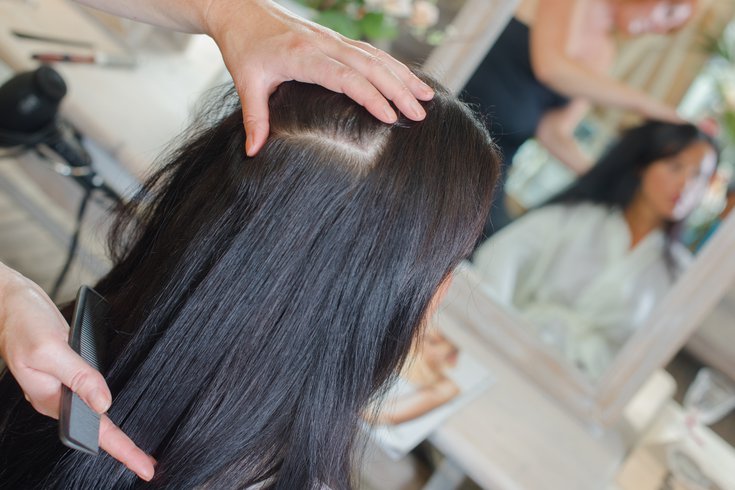
October 21, 2022
 Source/Image licensed from Ingram Image
Source/Image licensed from Ingram Image
The risk of uterine cancer more than doubled by age 70 among women who used chemical hair straighteners more than four times a year, a new study from the National Institutes of Health shows.
The frequent use of chemical hair straighteners may increase the risk of uterine cancer, according to a new study from the National Institutes of Health. But the researchers stressed that the overall risk of uterine cancer remains low – even among those who use these products.
The study found that the risk of uterine cancer more than doubled by age 70 among women who used chemical hair straighteners more than four times a year. This included applying products by oneself or having them applied by others.
"This doubling rate is concerning. However, it is important to put this information into context – uterine cancer is a relatively rare type of cancer," said researcher Alexandra White, head of the environment and cancer epidemiology group of the National Institute of Environmental Health Sciences.
Researchers also stressed that their study did not prove a cause-and-effect relationship.
Though the increased risk was observed across all racial and ethnic backgrounds, Black women may be affected the most, researchers said. Sixty percent of the study participants who reported using hair straighteners were Black women.
"Because Black women use hair straightening or relaxer products more frequently and tend to initiate use at earlier ages than other races and ethnicities, these findings may be even more relevant for them," said researcher Che-Jung Chang.
Yet, researchers said they did not want to induce panic.
"One could make a decision to reduce this chemical exposure, but we also want to acknowledge that there is a lot of pressure on women, especially Black women, to have straight hair," White told The New York Times. "It's not an easy decision to not do this."
Black people often face discrimination about their natural hair in schools and jobs. In some states, hair discrimination is still legal, though a bill to prevent it was passed by the U.S. House of Representatives earlier this year.
Previous studies also have linked hair straighteners to ovarian and breast cancers, but researchers said this was the first to suggest a connection to uterine cancer.
Their previous research on ovarian and breast cancer risk found that the use of other hair products, such as hair dyes, also increased risk. But the latest study found no association between uterine cancer and hair dyes, bleach or perm solutions.
Though the researchers didn't collect data on particular brands or ingredients of hair straightening products, they said several of the chemicals used in these products could impact one's risk of uterine cancer. That includes parabens, bisphenol A, metals and formaldehyde. Some of them also are also to disrupt the body's hormonal balance. Chemical hair straighteners, like other hair products, are not regulated by the U.S. Food and Drug Administration.
The study followed nearly 34,000 women for more than a decade. The risk for developing uterine cancer by age 70 was 1.64% for women who had never used hair straighteners and 4.05% for frequent users.
The study, published in The Journal of the National Cancer Institute, had some important limitations including the fact that more than 80% of the study participants were white and only 7% were Black.
Cancer of the uterus has been increasing among women in recent years, particularly among Black women. Women in the study who developed uterine cancer were older, with an earlier age of onset of menstruation, a higher body mass index and lower physical activity.
The researchers emphasized that there are other important risk factors for uterine cancer, including obesity, fertility issues, taking estrogen — without progesterone — for hormone replacement therapy during menopause, taking the drug tamoxifen to treat breast cancer, and a family history of uterine, colon or ovarian cancers.
Early signs of uterine cancer include regular spotting between periods, changes in menstrual bleeding before or after menopause, pelvic pain and pain while urinating or during sex. While women over 50 are generally considered at higher risk but, more women of childbearing age have been diagnosed with it in recent years.
The overall death rate from uterine cancer increased by an average 1.8% per year from 2010 to 2017, according to the National Cancer Institute. Black women more than twice as likely to die from uterine cancer. But if detected and treated early, there is a high survival rate.
Though the link between hair straighteners and uterine cancer is important, so is the need for regular exercise and maintaining a healthy weight, Dr. Eva Chalas, a gynecologic oncologist NYU Langone Health, told U.S. News & World Report.
"I worry that could get lost in this," Chalas said. "One of the reasons uterine cancer is rising is the epidemic of obesity. Obesity and lack of physical activity are definitely two modifiable risk factors that our society can do something about."